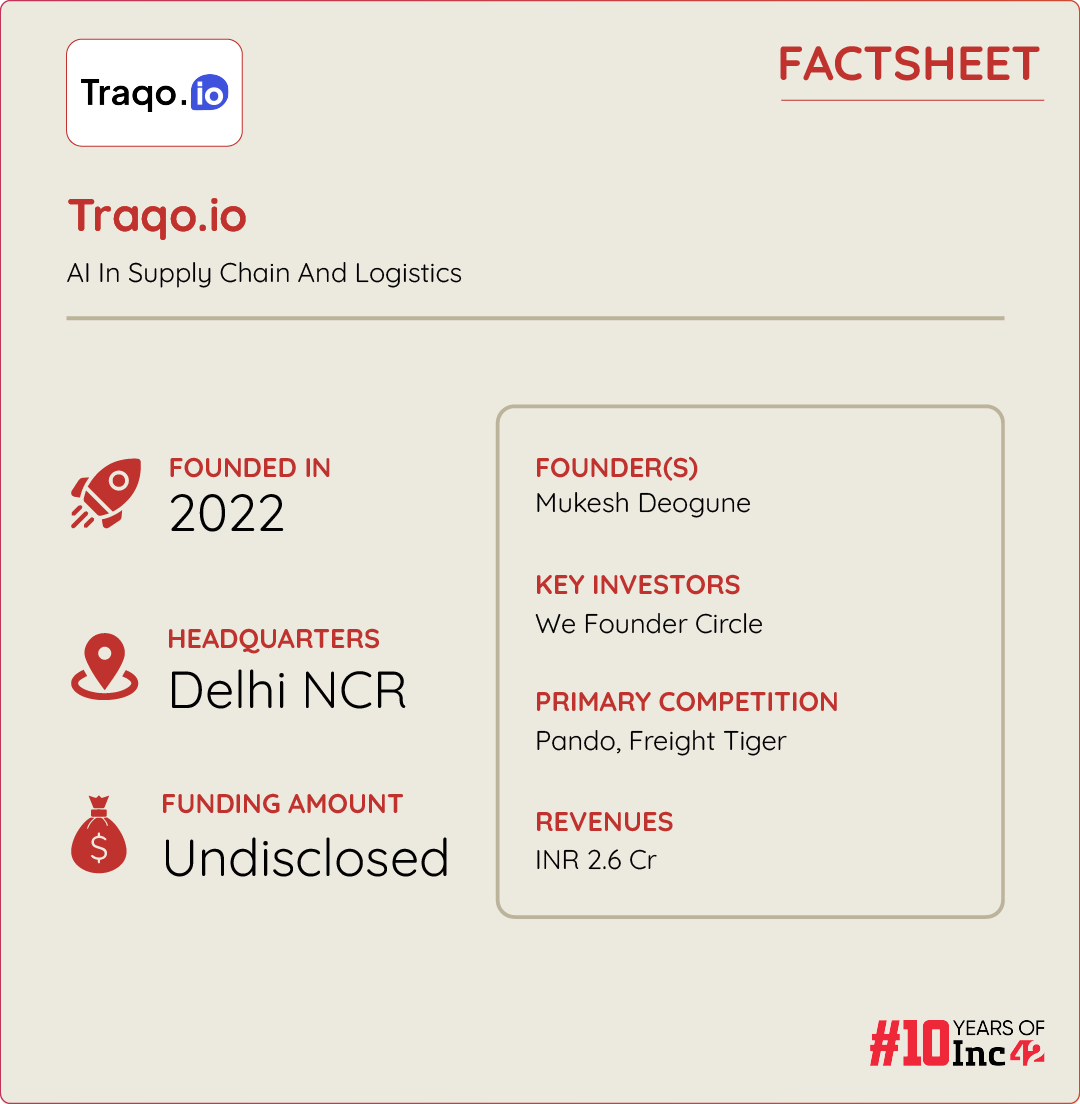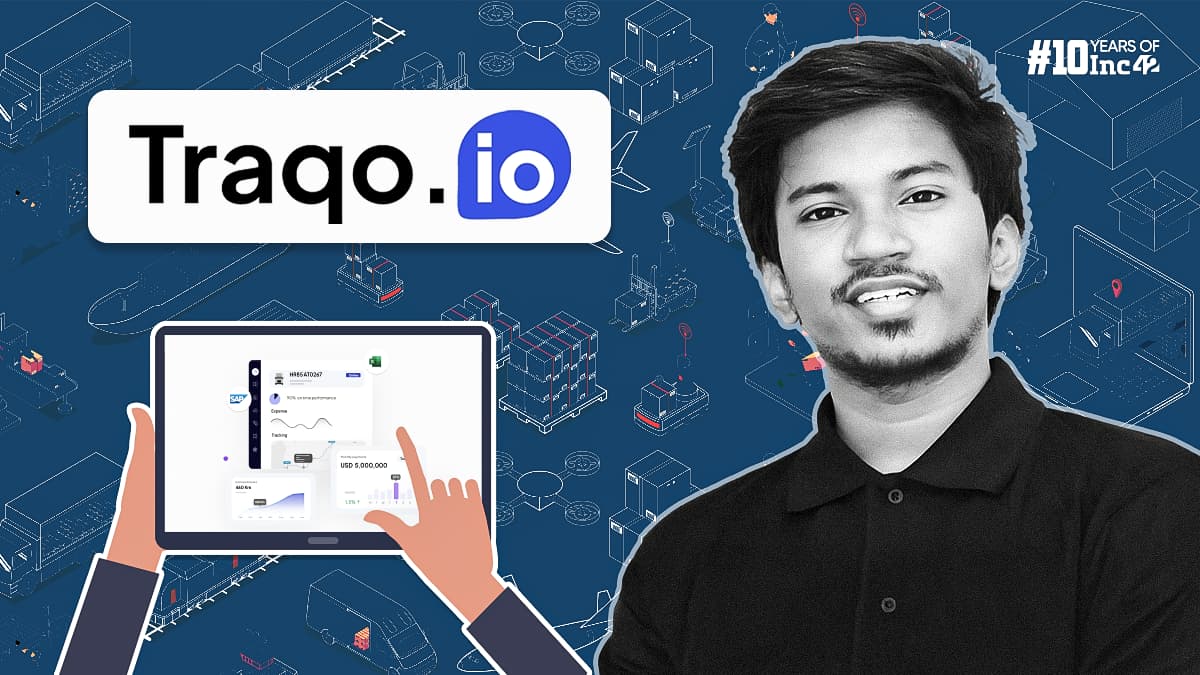Founded in 2022, Traqo is a third-party logistics management platform for manufacturers that provides visibility across the mid-mile freight cycle
Since its launch in 2022, the startup claims to have seen a 2.5X YoY growth in revenues. It anticipates closing the current fiscal at approximately INR 5 Cr
Traqo, which competes with Freight Tiger, Shipsy, LogiNext and the ilk, seems well-positioned to make the most of India’s expanding logistics market poised to breach the $591 Bn mark by FY27.
Tasked with moving goods from warehouses or fulfilment centres to the next point before reaching the end user, the middle mile or mid mile is often an overlooked stage in the supply chain process.
This stage involves transporting items in bulk and managing logistics between facilities. Unlike the last mile, which directly impacts the customer experience, the middle mile stage deals with large-scale transportation, inventory handling and dispatching.
Mid mile is often referred to as the backbone of the supply chain, as it keeps the supply chain moving. However, optimising this phase can be extremely challenging due to the complexities that envelop it. Consider the growing pressure to meet demands of speed, accuracy and efficiency amid rising costs and dull visibility due to multiple carriers and siloed systems.
Additionally, elements like labour shortages, increased warehousing costs, and a lack of appeal in physical, repetitive work make it increasingly difficult to maintain efficient and consistent mid-mile operations.
This is exactly where Traqo steps in. Founded in 2022 by Mukesh Deogune (now a third-time founder), Traqo specialises in resolving mid-mile and long-haul logistics gaps by automating freight procurement, planning, tracking, finance, and providing full visibility into operations. Simply put, Traqo is a third-party logistics management platform for manufacturers that provides visibility across the mid-mile freight cycle.
The startup would initially provide live camera devices for the logistics industry but soon realised that focussing on hardware required substantial funding, and the market was not ready for this big a leap yet.
However, this all began in 2020, right after Deogune completed his graduation, when he cofounded Signo to streamline driver management for companies. But with the onset of Covid-19, the business evolved into a service-oriented model, managing payroll for drivers and logistics staff, along with offering a full-stack logistics solution.
While Signo grew, Deogune became involved more in operations than tech, which was a shift from his passion for product development. Therefore, he decided to move on.
Leveraging his experiences, Deogune decided to address gaps in the logistics industry, specifically in the mid-mile logistics space.
“When analysing the supply chain, I noticed a specific problem in the mid-mile logistics segment that hadn’t been addressed. The mid-mile segment remains a complex area with multiple stakeholders in a single value chain,” Deogune explained the rationale behind incorporating Traqo, which came into being in 2022.
Speaking with Inc42, Deogune said mid-mile operations, spanning 100-200 Km, of the logistics chain are often underserved and complicated due to the involvement of multiple stakeholders.
Therefore, Traqo identified manufacturers who rely on third-party logistics vendors, as these manufacturers often deal with a mix of national and local vendors, and, in doing so, face challenges in managing logistics operations. This is how the Traqo founder said that his tech unclogs the mid-mile supply chain bottleneck.
A Glance At Traqo’s Tech Stack
Traqo aims to automate logistics operations entirely, replacing manual coordination with a platform that seamlessly integrates with order management systems. The tech allows manufacturers to automate vendor selection, communication, and even bidding through reverse auctions, where vendors compete for routes.
Further, Traqo simplifies and automates third-party logistics management for manufacturers. It is largely focussed on sectors like building materials, steel, furniture, and plywood, as well as the ones that are hugely dependent on a complex network of logistics vendors.
Traqo enables manufacturers to streamline their logistics by replacing manual processes with a fully integrated, automated platform. The platform syncs with the manufacturer’s order management system, pulling information on orders that need delivery, and then assigning suitable vendors to handle the shipments. Vendors are notified via WhatsApp, email, or other means, and they can even participate in a reverse auction, where they bid for delivery jobs, allowing manufacturers to save costs on transport.
The Traqo platform also optimises delivery planning by consolidating shipments to reduce costs. For instance, if two customers in the same area have smaller, separate orders, Traqo’s system can combine these into one larger shipment. This reduces the manufacturer’s freight costs by up to 50%.
The platform operates across three main modules — planning, tracking, and audit. The planning module ensures at least 15% cost savings in freight through efficient scheduling and route optimisation, while tracking provides end-to-end supply chain visibility, enabling real-time tracking of shipments to enhance transparency and accountability. The audit module manages documentation and performs audits on vendor payments, ensuring accurate and complete financial records.


Is Traqo On Track?
Initially, Traqo started with a small customer base, where the contract value was around $6K. As it expanded, the startup began serving clients with contracts in the range of $15-$20K, and now it claims to have customers paying up to $50,000 as annual contract value. Some of its current clients include prominent names such as Tata Hitachi, Tata Chroma, and Panasonic.
“Although we are sector agnostic, we have developed particularly strong use cases in building materials. Companies in industries like furniture, cement, steel, and white goods benefit significantly from our solutions due to the specific logistics challenges they face,” the founder said.
Since its launch in 2022, the startup claims to have seen a 2.5X year-on-year (YoY) growth in revenue. In the first year of its operations, the company garnered INR 80 Lakh in revenues, and then grew to around INR 2.7 Cr the following year. The founder anticipates closing the current fiscal at approximately INR 5 Cr.
“For this financial year, we are focusing on key metrics that drive sustainable growth. These include expanding our customer base, increasing the annual contract value (ACV), and delivering the cost savings and efficiencies that we’ve committed to our clients. Additionally, maintaining our cost-savings impact of at least 15% for clients is essential to our long-term strategy,” Deogune said.
As of now, Traqo, which competes with Freight Tiger, Shipsy, LogiNext and the ilk, seems well-positioned to make the most of India’s expanding logistics market, poised to breach the $591 Bn mark by FY27. It also has a healthy list of more than 100 clients that use its platform to reduce logistics costs by automating day-to-day movement from vehicle procurement to payment settlements.
However, the startup seems to be restricting the potential of its tech by adhering to unclogging mid-mile bottlenecks only, especially at a time when numerous opportunities are mushrooming in the last mile paradigm with the explosion of quick commerce and 10-minute business models.
[Edited by Shishir Parasher]

